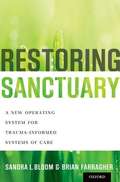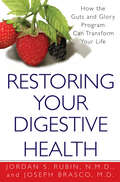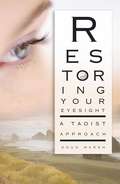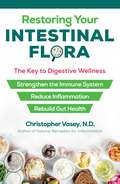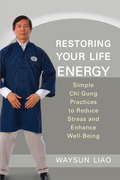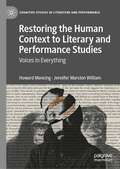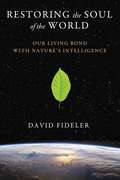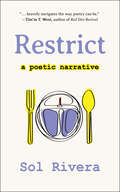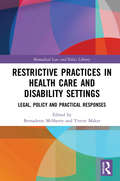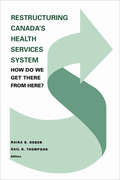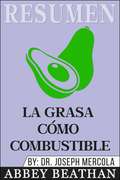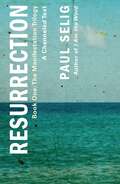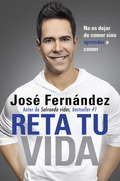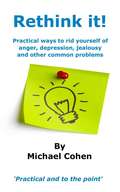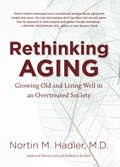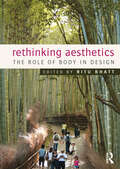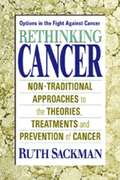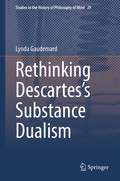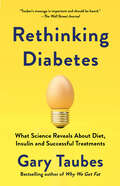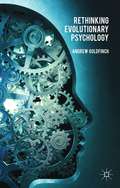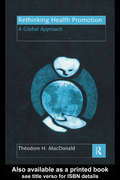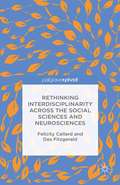- Table View
- List View
Restoring Sanctuary: A New Operating System for Trauma-Informed Systems of Care
by Sandra L. Bloom Brian FarragherThis is the third in a trilogy of books that chronicle the revolutionary changes in our mental health and human service delivery systems that have conspired to disempower staff and hinder client recovery. Creating Sanctuary documented the evolution of The Sanctuary Model therapeutic approach as an antidote to the personal and social trauma that clients bring to child welfare agencies, psychiatric hospitals, and residential facilities. Destroying Sanctuary details the destructive role of organizational trauma in the nation's systems of care. Restoring Sanctuary is a user-friendly manual for organizational change that addresses the deep roots of toxic stress and illustrates how to transform a dysfunctional human service system into a safe, secure, trauma-informed environment.
Restoring Your Digestive Health: A Proven Plan to Conquer Crohn's, Colitis, and Digestive Diseases
by Jordan Rubin Joseph BrascoConquer Crohn&’s, Colitis, and Digestive Diseases Long before Jordan Rubin became one of America&’s most respected natural health experts, Crohn's disease nearly ended his life. A once-healthy teenager, Jordan suffered the debilitating effects of the painful and potentially fatal wasting intestinal illness. In desperation, he consulted more than seventy medical experts in seven countries, and tried hundreds of nutritional supplements, with no improvement. Finally, Jordan researched and developed a revolutionary wellness program based on a more health-promoting diet, including the use of fermented foods, bone broths, and soil-based organisms (SBOs), an often-overlooked but critical component of our ancestors' primitive diet. Within months, Jordan&’s health improved. Years later, he remains free of disease or medications. He calls his regimen the Guts and Glory Program, but if you suffer from Crohn's or any of a host of other digestive or systemic disorders, you'll call it amazing. This program helps heal: *Crohn's disease or ulcerative colitis ·Irritable bowel syndrome · Gluten or lactose intolerance · Candida (yeast) infections · Food allergies · Recurring or persistent nausea · Chronic constipation · Urinary tract infections · And many more serious aliments You&’ll also learn: ·Why fermented foods and HSOs are vital to good health—and why they're missing from today's diets ·How a &“primitive&” lifestyle offers very modern health benefits · How to find and prepare delicious meals the primitive way · What dietary supplements can help—and which to avoid Jordan continues to share his message of hope and healing through his books, videos, and nutritional products. In Restoring Your Digestive Health, you&’ll learn to do just that, and live a pain-free, nourishing life.
Restoring Your Eyesight: A Taoist Approach
by Doug Marsh Thomas R. QuackenbushA holistic guide to improving one’s vision both physically and spiritually • Explains how blurred vision is a reflection of other imbalances in the body, mind, and spirit • Offers natural methods for improvement of poor eyesight and stress-related difficulties, including dyslexia and ADHD • Combines the core values of the Bates method of natural vision improvement and Taoism Fewer than three percent of children in North America are born with visual defects, yet as they become adults nearly two thirds will become reliant on prescription lenses to see clearly. Virtually nonexistent in pre-industrialized cultures, this epidemic of blurred vision can be traced to mental, physical, and spiritual imbalances in modern society. The traditional “quick fixes” of eyeglasses and contact lenses only serve to cover the true cause of blurred vision while increasing eye-strain, and often progressively worsen eyesight as the eyes become trained to work within the confines of the corrective lenses. The advent of refractive surgery carries even more serious risks. In Restoring Your Eyesight, Doug Marsh offers a natural alternative that shows readers how to improve their eyesight by taking conscious control of their vision health. He combines proven methods pioneered a century ago by eye doctor William Bates with the ancient Chinese wisdom of Taoism. Marsh describes how vision goes deeper than the eyes and optic nerves, extending well into the layers of the mind, emotions, and spirit. Eyesight difficulties are often connected to behavioral and stress-related syndromes, such as dyslexia, ADHD, stuttering, TMJ, and anxiety disorders. He draws upon the core values of the Bates method and Taoism--rhythm, softness, return, balance, and wholeness--to provide guidelines for a holistic healing of outer and inner vision.
Restoring Your Intestinal Flora: The Key to Digestive Wellness
by Christopher Vasey• Examines the many functions of your intestinal flora and their role in a healthy immune system, including their anti-inflammatory effects • Explores the major causes of weakened flora, especially the overuse of antibiotics and the overconsumption of refined, low-fiber foods in the modern diet • Details how to restore your flora after taking antibiotics and how to strengthen your flora with prebiotics, probiotics, and simple changes in eating and drinking habits Our intestinal flora perform a large number of duties--far more than just aiding digestion. Recent research has revealed that our intestinal flora help fight off infections by killing microbes and viruses, increase our resistance to allergens and inflammation, cleanse our internal systems by neutralizing toxins, and even support our moods and energy levels by interacting with hormones and neurotransmitters. In this easy-to-follow guide, Christopher Vasey explains how to restore balance to your microbiome. He examines the many functions of intestinal flora and their role in a healthy immune system, including their anti-inflammatory effects and role in the creation of lymphocytes. He explores the major causes of weakened flora, especially the overuse of antibiotics and the overconsumption of refined, low-fiber foods, and he outlines the ailments and diseases that can result, such as bloating, food intolerance, mood swings, fungal infections, and greater susceptibility to colds and flu. Offering step-by-step methods, Vasey explains how to restore the flora after taking medications such as antibiotics, how to support your flora with the ingestion of prebiotics: high-fiber foods that provide essential nutrients for good gut health, and how to strengthen your flora with probiotics: foods or supplements that facilitate the regeneration of healthy intestinal flora. The author explores simple changes you can make in your eating and drinking habits to support your microbiome as well as practices to keep the flora of the colon out of the intestinal environment where they can wreak havoc. He also details the steps of the healing process, including the cleansing reactions you may experience as your intestinal flora rebalances. Providing everything you need to know for optimum digestive wellness, Vasey shows that repairing the balance of your intestinal flora is simple and accessible to anyone.
Restoring Your Life Energy: Simple Chi Gung Practices to Reduce Stress and Enhance Well-Being
by Waysun LiaoIn our busy lives we are bombarded by energy that taxes us and depletes our chi. This book of simple movements and meditations drawn from the Chinese arts of t'ai chi and chi gung will help restore your life energy, known as chi. Chi, according to traditional Chinese medicine, is the fuel and essence that connects body, mind, and spirit, and without it we fall apart physically, mentally, and spiritually. In Restoring Your Life Energy, well-known and respected t'ai chi master Waysun Liao explains why protecting our chi is so important, how chi gets taxed and damaged in our lives, and how to restore it. He explains: * The three levels of healing--physical, mental, and energetic/spiritual: what they are, why it is important to understand them, and how to target our practice to address each level; * Moving meditation, a powerful way of restoring chi (once we learn to sense the flow of chi, we can actually direct healing chi energy to areas in our body that need attention); * And how to integrate our knowledge of chi with conventional advice regarding diet, exercise, and medication. The book includes numerous exercises including "exercises for daily life," simple breathing and sensory meditations that can be done throughout the day; more advanced breathing and sensory meditations; standing exercises to move internal energy; "cleansing forms" to do during times of stress; and deeply cleansing and restorative "Tao gong" exercises.
Restoring the Human Context to Literary and Performance Studies: Voices in Everything (Cognitive Studies in Literature and Performance)
by Howard Mancing Jennifer Marston WilliamRestoring the Human Context to Literary and Performance Studies argues that much of contemporary literary theory is still predicated, at least implicitly, on outdated linguistic and psychological models such as post-structuralism, psychoanalysis, and behaviorism, which significantly contradict current dominant scientific views. By contrast, this monograph promotes an alternative paradigm for literary studies, namely Contextualism, and in so doing highlights the similarities and differences among the sometimes-conflicting contemporary cognitive approaches to literature and performance, arguing not in favor of one over the other but for Contextualism as their common ground.
Restoring the Soul of the World: Our Living Bond with Nature’s Intelligence
by David FidelerHumanity’s creative role within the living pattern of nature • Explores important scientific discoveries that reveal the self-organizing intelligence at the heart of nature • Examines the idea of a living cosmos from its roots in the earliest cultures, to its eclipse during the Scientific Revolution, to its return today • Reveals ways to reengage our creative partnership with nature and collaborate with nature’s intelligence For millennia the world was seen as a creative, interconnected web of life, constantly growing, developing, and restoring itself. But with the arrival of the Scientific Revolution in the 16th and 17th centuries, the world was viewed as a lifeless, clocklike mechanism, bound by the laws of classical physics. Intelligence was a trait ascribed solely to human beings, and thus humanity was viewed as superior to and separate from nature. Today new scientific discoveries are reviving the ancient philosophy of a living, interconnected cosmos, and humanity is learning from and collaborating with nature’s intelligence in new, life-enhancing ways, from ecological design to biomimicry. Drawing upon the most important scientific discoveries of recent times, David Fideler explores the self-organizing intelligence at the heart of nature and humanity’s place in the cosmic pattern. He examines the ancient vision of the living cosmos from its roots in the “world soul” of the Greeks and the alchemical tradition, to its eclipse during the Scientific Revolution, to its return today. He explains how the mechanistic worldview led to humanity’s profound sense of alienation, for if the universe only functioned as a machine, there was no longer any room for genuine creativity or spontaneity. He shows how this isn’t the case and how, even at the molecular level, natural systems engage in self-organization, self-preservation, and creative problem solving, mirroring the ancient idea of a creative intelligence that exists deep within the heart of nature. Revealing new connections between science, religion, and culture, Fideler explores how to reengage our creative partnership with nature and new ways to collaborate with nature’s intelligence.
Restrict: A Poetic Narrative
by Sol RiveraA powerful work of poetic narrative fiction, Restrict is the raw yet resonant story of a teenage girl's coming of age in a world that cares more about her weight than her mental health.Told from the perspective of a young woman who has abandoned her own name to distance herself from the emotional trauma of growing up, Little Girl&’s story is a modern examination of eating disorders, body image, puberty, and self-worth. And as the pressure to diet starts to become too much, the question faced by Little Girl is this: how can she ever experience self-love in a world focused solely on her appearance?Created by teenage author Sol Rivera, Restrict is her powerful and cathartic tale of a struggle shared amongst teenagers. This poetry collection serves as a light on the journey of self-discovery… something which too many have been denied.
Restrictive Practices in Health Care and Disability Settings: Legal, Policy and Practical Responses (Biomedical Law and Ethics Library)
by Bernadette McSherryThis volume explores different models of regulating the use of restrictive practices in health care and disability settings. The authors examine the legislation, policies, inspection, enforcement and accreditation of the use of practices such as physical, mechanical and chemical restraint. They also explore the importance of factors such as organisational culture and staff training to the effective implementation of regulatory regimes. In doing so, the collection provides a solid evidence base for both the development and implementation of effective approaches to restrictive practices that focus on their reduction and, ultimately, their elimination across health care sectors. Divided into five parts, the volume covers new ground in multiple respects. First, it addresses the use of restrictive practices across mental health, disability and aged care settings, creating opportunities for new insights and interdisciplinary conversations across traditionally siloed sectors. Second, it includes contributions from research academics, clinicians, regulators and mental health consumers, offering a rich and comprehensive picture of existing regulatory regimes and options for designing and implementing regulatory approaches that address the failings of current systems. Finally, it incorporates comparative perspectives from Australia, New Zealand, the Netherlands, Germany and England. The book is an invaluable resource for regulators, policymakers, lawyers, clinicians, consumer advocates and academics grappling with the use and regulation of restrictive practices in mental health, disability and aged care contexts.
Restructuring Canada's Health Systems: Proceedings of the Fourth Canadian Conference on Health Economics
by Raisa Deber Gail ThompsonIs the Canadian health care system becoming a victim of its own success? It has done what it set out to do – provide universal access to all medically necessary health services without financial barriers to patients – but expanding technology, an aging population, and escalating costs strain its ability to continue. It is time to explore ways to reorient and restructure the health care system and the services it provides. At the Fourth Canadian Conference on Health Economics, contributors of international reputation addressed these concerns. Their papers, collected in this volume, consider a wide range of fundamental issues related to health care policies and structures. They discuss new developments in health care delivery, assess implications of such new policies as home care and health promotion, and propose concrete alternatives for restructuring the present system to sustain universal medicine.
Resumen: La Grasa cómo Combustible
by Abbey Beathan Inaki Vega Bayo¿Qué ocurriría si los científicos estuviesen persiguiendo un paradigma erróneo? ¿Qué pasaría si sus teorías acerca de cómo surge el cáncer fuesen erróneas? Durante mucho tiempo, hemos aceptado que el cáncer nace de una enfermedad genética debido a cromosomas dañados. Sin embargo, ¿y si estamos equivocados? ¿Y si estamos pensando en el punto de salida equivocado lo que nos hace abordar la enfermedad más mortal en el mundo de forma equivocada? En esta magnífica guía, Joseph Mercola entra al debate y nos enseña cómo la mayoría de las enfermedades se generan por procesos metabólicos defectuosos. Esto es algo revolucionario ya que nos demuestra que sí tenemos la posibilidad de luchar por minimizar las probabilidades de contraer cáncer. (Nota: Este resumen está escrito y publicado en su totalidad por Abbey Beathan. No está relacionado con el autor original de ninguna manera)
Resurrection: (Book One of the Manifestation Trilogy) (The Manifestation Trilogy #1)
by Paul SeligKnowledge and Insight from a World Apart from Our OwnResurrection is the first book in the groundbreaking new Manifestation Trilogy from renowned channel Paul Selig. Selig’s unique gift is to channel the voice of the Guides, otherworldly beings of great wisdom and tremendous spiritual insight. Resurrection is composed of their raw, unedited words, as spoken by Paul. In it, he shares the new manifestation of humanity, a vision of alteration and elevation that will shift how we think and move through the world. Building on the success of his Beyond the Known series, this new trilogy will give readers a glimpse into the spiritual underpinnings that govern the world we live in. Resurrection is an astonishing invitation to rethink, reconstruct, and rebirth our world view in a transcendent way.
Reta Tu Vida: No es dejar de comer SINO aprender a comer
by José Fernandez¿Sueñas con bajar de peso y transformar tu cuerpo? ¿Quieres aprender a comer más sano? ¿Pero simplemente no sabes por dónde empezar? ¡Deja de sufrir! <P><P> En Reta tu vida, José Fernández, autor bestseller de Salvando vidas, te invita a retarte como nunca antes lo has hecho, para transformar tu vida y adoptar por fin un estilo de vida saludable que no sólo te permitirá perder peso, sino que te enseñará a cuidar de tu cuerpo y tu alma de aquí en adelante y por el resto de tu vida. Con el carisma y el humor que lo caracteriza, José Fernández, entrenador de las estrellas, comparte aquí retos para: · Decir adiós a la celulitis ¡de una vez por todas! · Conseguir un abdomen plano · Llevar a toda tu familia hacia una alimentación más saludable. Con fabulosos tips Instagram y menús detallados que contienen deliciosas recetas saludables que te harán olvidar que estás a dieta, Reta tu vida es el libro que te ofrecerá la inspiración y la información que necesitarás para cambiar tus hábitos y transformar tu cuerpo sin tener que sacrificar las cosas que más te gustan. Porque como dice el mismo José: "No es dejar de comer, ¡es aprender a comer!".From the Trade Paperback edition.
Rethink HIV: Smarter Ways to Invest in Ending HIV in Sub-Saharan Africa
by Bjørn LomborgThirty years after the identification of the disease that became known as AIDS, humanitarian organizations warn that the fight against HIV/AIDS has slowed, amid a funding shortfall and donor fatigue. In this book, Bjørn Lomborg brings together research by world-class specialist authors, a foreword by UNAIDS founding director Peter Piot and perspectives from Nobel Laureates and African civil society leaders to identify the most effective ways to tackle the pandemic across sub-Saharan Africa. There remains an alarming lack of high-quality data evaluating responses to HIV. We still know too little about what works, where and how to replicate our successes. This book offers the first comprehensive attempt by teams of authors to analyze HIV/AIDS policy choices using cost-benefit analysis, across six major topics. This approach provides a provocative fresh look at the best ways to scale up the fight against this killer epidemic.
Rethink it!: Practical Ways to rid yourself of anger, depression, jealousy and other common problems
by Michael CohenDo you tell yourself, "I'm not good enough," or "Things are far too difficult, why should I even try?"
Rethinking AGING
by Nortin M. HadlerFor those fortunate enough to reside in the developed world, death before reaching a ripe old age is a tragedy, not a fact of life. Although aging and dying are not diseases, older Americans are subject to the most egregious marketing in the name of "successful aging" and "long life," as if both are commodities. InRethinking Aging, Nortin M. Hadler examines health-care choices offered to aging Americans and argues that too often the choices serve to profit the provider rather than benefit the recipient, leading to the medicalization of everyday ailments and blatant overtreatment. Rethinking Agingforewarns and arms readers with evidence-based insights that facilitate health-promoting decision making. Over the past decade, Hadler has established himself as a leading voice among those who approach the menu of health-care choices with informed skepticism. Only the rigorous demonstration of efficacy is adequate reassurance of a treatment's value, he argues; if it cannot be shown that a particular treatment will benefit the patient, one should proceed with caution. InRethinking Aging, Hadler offers a doctor's perspective on the medical literature as well as his long clinical experience to help readers assess their health-care options and make informed medical choices in the last decades of life. The challenges of aging and dying, he eloquently assures us, can be faced with sophistication, confidence, and grace.
Rethinking Aesthetics: The Role of Body in Design
by Ritu BhattRethinking Aesthetics is the first book to bring together prominent voices in the fields of architecture, philosophy, aesthetics, and cognitive sciences to radically rethink the relationship between body and design. These essays argue that aesthetic experiences can be nurtured at any moment in everyday life, thanks to recent discoveries by researchers in neuroscience, phenomenology, somatics, and analytic philosophy of the mind, who have made the correlations between aesthetic cognition, the human body, and everyday life much clearer. The essays, by Yuriko Saito, Juhani Pallasmaa, and Richard Shusterman, among others, range from an integrated mind-body approach to chair design, to Zen Buddhist notions of mindfulness, to theoretical accounts of existential relationships with buildings, to present a full spectrum of possible inquiries. By placing the body in the center of design, Rethinking Aesthetics opens new directions for rethinking the limits of both essentialism and skepticism.
Rethinking Aesthetics: The Role of Body in Design
by Ritu BhattRethinking Aesthetics is the first book to bring together prominent voices in the fields of architecture, philosophy, aesthetics, and cognitive sciences to radically rethink the relationship between body and design. These essays argue that aesthetic experiences can be nurtured at any moment in everyday life, thanks to recent discoveries by researchers in neuroscience, phenomenology, somatics, and analytic philosophy of the mind, who have made the correlations between aesthetic cognition, the human body, and everyday life much clearer. The essays, by Yuriko Saito, Juhani Pallasmaa, and Richard Shusterman, among others, range from an integrated mind-body approach to chair design, to Zen Buddhist notions of mindfulness, to theoretical accounts of existential relationships with buildings, to present a full spectrum of possible inquiries. By placing the body in the center of design, Rethinking Aesthetics opens new directions for rethinking the limits of both essentialism and skepticism.
Rethinking Cancer
by Ruth SackmanThe Foundation for Advancement in Cancer Therapy (FACT) has long worked to educate cancer patients about alternative therapies, enabling them to make informed decisions on treatment options. Unfortunately, there still remains a major gap in the distribution of information. To meet this challenge, Ruth Sackman has written Rethinking Cancer. Here, you&’ll find pertinent information on a wide range of topics, including the role of nutrition in health and strategies for achieving detoxification. The author provides both valid research and specific advice.
Rethinking Descartes’s Substance Dualism (Studies in the History of Philosophy of Mind #29)
by Lynda GaudemardThis monograph presents an interpretation of Descartes's dualism, which differs from the standard reading called 'classical separatist dualism' claiming that the mind can exist without the body. It argues that, contrary to what it is commonly claimed, Descartes’s texts suggest an emergent creationist substance dualism, according to which the mind is a nonphysical substance (created and maintained by God), which cannot begin to think without a well-disposed body. According to this interpretation, God’s laws of nature endow each human body with the power to be united to an immaterial soul. While the soul does not directly come from the body, the mind can be said to emerge from the body in the sense that it cannot be created by God independently from the body. The divine creation of a human mind requires a well-disposed body, a physical categorical basis. This kind of emergentism is consistent with creationism and does not necessarily entail that the mind cannot survive the body. This early modern view has some connections with Hasker’s substance emergent dualism (1999). Indeed, Hasker states that the mind is a substance emerging at one time from neurons and that consciousness has causal powers which effects cannot be explained by physical neurons. An emergent unified self-existing entity emerges from the brain on which it acts upon. For its proponents, Hasker’s view explains what Descartes’s dualism fails to explain, especially why the mind regularly interacts with one and only one body. After questioning the notion of emergence, the author argues that the theory of emergent creationist substance dualism that she attributes to Descartes is a more appropriate alternative because it faces fewer problems than its rivals. This monograph is valuable for anyone interested in the history of early modern philosophy and contemporary philosophy of mind.
Rethinking Diabetes: What Science Reveals About Diet, Insulin, and Successful Treatments
by Gary TaubesAn eye-opening investigation into the history of diabetes research and treatment by the award-winning journalist and best-selling author of Why We Get Fat • "[Gary] Taubes&’s meticulous, science-based work makes him the Bryan Stevenson of nutrition, an early voice in the wilderness for an unorthodox view that is increasingly becoming accepted."—Neil Barsky, The GuardianBefore the discovery of insulin, diabetes was treated almost exclusively through diet, from subsistence on meat, to reliance on fats, to repeated fasting and near-starvation regimens. After two centuries of conflicting medical advice, most authorities today believe that those with diabetes can have the same dietary freedom enjoyed by the rest of us, leaving the job of controlling their disease to insulin therapy and other blood-sugar-lowering medications. Rather than embark on &“futile&” efforts to restrict sugar or carbohydrate intake, people with diabetes can lead a normal life, complete with the occasional ice-cream cake, side of fries, or soda.These guiding principles, however, have been accompanied by an explosive rise in diabetes over the last fifty years, particularly among underserved populations. And the health of those with diabetes is expected to continue to deteriorate inexorably over time, with ever-increasing financial, physical, and psychological burdens. In Rethinking Diabetes, Gary Taubes explores the history underpinning the treatment of diabetes, types 1 and 2, elucidating how decades-old research that is rife with misconceptions has continued to influence the guidance physicians offer—at the expense of their patients&’ long-term well-being.The result of Taubes&’s work is a reimagining of diabetes care that argues for a recentering of diet—particularly, fewer carbohydrates and more fat—over a reliance on insulin. Taubes argues critically and passionately that doctors and medical researchers should question the established wisdom that may have enabled the current epidemic of diabetes and obesity, and renew their focus on clinical trials to resolve controversies that are now a century in the making.
Rethinking Evolutionary Psychology
by A. GoldfinchRethinking Evolutionary Psychology identifies, champions and vindicates a streamlined evolutionary psychology. It offers a new way of thinking that moves decisively away from theoretical and critical excess. Where standard accounts often obscure and distort, this book emphasizes and develops evolutionary psychology's heuristic credentials.
Rethinking Health Promotion: A Global Approach
by Theodore H. MacDonaldIn today's world 'health' means far more than merely the absence of illness. In Rethinking Health Promotion Theodore H. MacDonald sweeps away the confusion surrounding the function and position of health promotion. He argues that, far from being a modern innovation, health promotion has existed as a distinct and separate enterprise for as long as biomedicine and cautions against health promotion becoming organized merely an off-shoot of medical care. Drawing on the author's experience as a World Health Organisation consultant, the book also tackles the question of whether health promotion has relevance on an international scale or whether it is purely a eurocentric phenomenon. Against this background individual chapters explore universal factors such as sexual health, diet, unemployment, alcohol and tobacco use. With its critical and historical approach this book breaks new ground in assessing health promotion and will be stimulating reading for the wide variety of students and professionals studying health promotion.
Rethinking Informed Consent in Bioethics
by Neil C. Manson Onora O'NeillManson and O'Neill show why informed consent cannot be fully specific or fully explicit, and why more specific consent is not always ethically better.
Rethinking Interdisciplinarity across the Social Sciences and Neurosciences
by F. Callard D. FitzgeraldThis book offers a provocative account of interdisciplinary research across the neurosciences, social sciences and humanities. Rooting itself in the authors' own experiences, the book establishes a radical agenda for collaboration across these disciplines. This book is open access under a CC-BY license.
